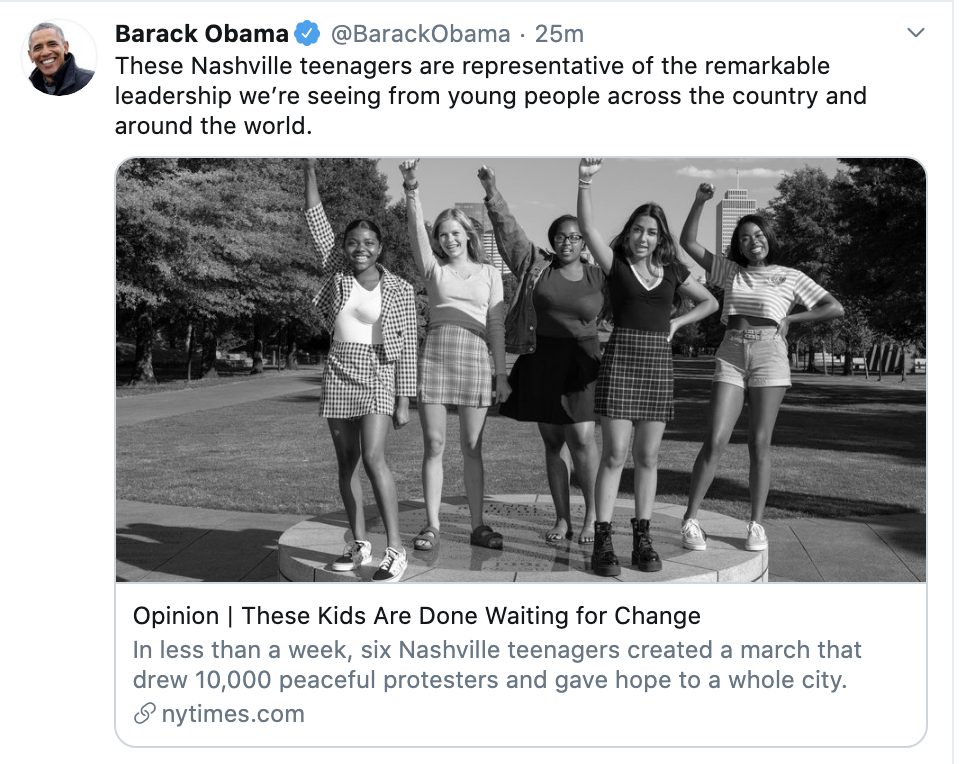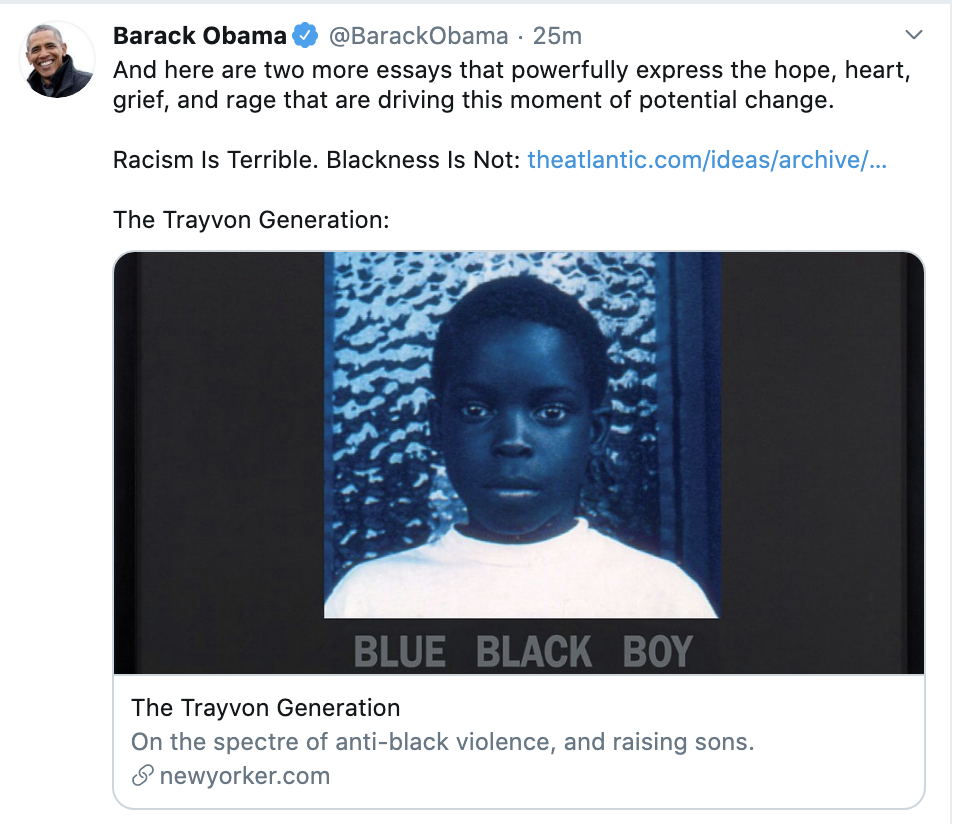People yearn for President Barack Obama. When he was on the job, he was on the job: brilliant, strategical, thoughtful, compassionate, logical, a leader, and courageous. In other words, he was everything Donald Trump is not. Never fear though.
Ever since his former Vice President Joe Biden (D) announced he was going to run for the 2020 presidential slot, 44 has been coming out of his self-imposed exile. Tuesday, President Obama posted two tweets offering the country hope.
Quietly and behind the scenes, Obama has been working with young people, because they are tomorrow’s leaders. Only a confident individual could urge these young teenaged women to rise to leadership. He tweeted:
‘These Nashville teenagers are representative of the remarkable leadership we’re seeing from young people across the country and around the world.’
Then, President Obama referred Americans “that powerfully express the hope, heart, grief, and range.” He added that “Racism is terrible. Blackness is not:”
‘And here are two more essays that powerfully express the hope, heart, grief, and rage that are driving this moment of potential change. Racism Is Terrible. Blackness Is Not: theatlantic.com/ideas/archive/ The Trayvon Generation:’
Professor of African American Studies at Princeton University Imani Perry wrote in The Atlantic magazine:
‘A lot of kind statements about black people are coming from the pens and minds of white people now. That’s a good thing. But sometimes, it is frankly hard to tell the difference between expressions of solidarity and gestures of absolution (See, I’m not a racist, I said you matter!) Among the most difficult to swallow are social-media posts and notes that I and others have received expressing sorrow and implying that blackness is the most terrible of fates. Their worrisome chorus: “I cannot imagine … How do you … My heart breaks for you … I know you are hurting … You may not think you matter but you matter to me.” Let me be clear: I certainly know I matter. Racism is terrible. Blackness is not.’
Perry continued, speaking about his happiness:
‘I cannot remember a time in my life when I wasn’t earnestly happy about the fact of my blackness. When my cousins and I were small, we would crowd in front of the mirrors in my grandmother’s house, admiring our shining brown faces, the puffiness of our hair.’
He refers to “my elders,” which is a respectful way to refer to older individuals and what knowledge they offered to their descendants. They taught him that he belonged “to a tradition of resilience:”
‘My elders taught me that I belonged to a tradition of resilience, of music that resonates across the globe, of spoken and written language that sings. If you’ve had the good fortune to experience a holiday with a large black American family, you have witnessed the masterful art of storytelling, the vitality of our laughter, and the everyday poetry of our experience. The narrative boils down quite simply to this: “We are still here! Praise life, after everything, we are still here!” So many people taught us to be more than the hatred heaped upon us, to cultivate a deep self-regard no matter what others may think, say, or do. Many of us have absorbed that lesson and revel in it.’
Then the author wrote about a black woman Zora Neale Hurston who wrote an essay in 1928. She said:
‘One of the classic texts in African American studies is Zora Neale Hurston’s 1928 essay “How It Feels to Be Colored Me.” Her playful yet profound articulation resonates for me now. She wrote, “I am not tragically colored. There is no great sorrow dammed up in my soul, nor lurking behind my eyes. I do not mind at all. I do not belong to the sobbing school of Negrohood who hold that nature somehow has given them a lowdown dirty deal and whose feelings are all but about it … No, I do not weep at the world—I am too busy sharpening my oyster knife.”‘
Perry referred to her words as “too hopeful:”
‘Some of her words, I must admit, are too hopeful, at least for me right now. In fact, I do weep at the world; I am, in a sense, part of the sobbing school; and I am skeptical that my lone oyster knife can cut any of the rot out of this nation. But, like Hurston, I refuse to see the story of who I am as a tragedy.’
He reminded America that a dying man “calling for his mama…echoes into the distant past and cuts into our deepest wounds.” That call for his mama touched women of all colors at a visceral level. Yet, he added there is joy. “Blackness is an immense and defiant joy:”
‘Joy is not found in the absence of pain and suffering. It exists through it. The scourges of racism, poverty, incarceration, medical discrimination, and so much more shape black life. We live with the vestiges of slavery and Jim Crow, and with the new creative tides of anti-blackness directed toward us and our children. We know the wail of a dying man calling for his mama, and it echoes into the distant past and cuts into our deepest wounds. The injustice is inescapable. So yes, I want the world to recognize our suffering. But I do not want pity from a single soul. Sin and shame are found in neither my body nor my identity. Blackness is an immense and defiant joy.’
Then, Perry continued reminding all Americans about the black Americans with Rebecca Carroll’s words. You should be feeling miserable “are experiencing a collective grief” and come with “hands full of pearls:”
‘Black Americans right now are experiencing a collective grief, one that unfolds publicly. And we are unable to tuck it away. I do think Hurston would have to admit this too, were she around today. She wrote her essay before Brown v. Board of Education, the Montgomery bus boycott, the Birmingham crusade, the March on Washington, Freedom Summer, the Voting Rights Act, the Civil Rights Acts, the rise of black mayors, the first black governor, the first black president. She wrote her essay before we understood how tightly this nation would grasp onto its original sin even after legions of black people came with razor-sharp oyster knives and hands full of pearls.’
Yet, black people in America “continue to die prematurely.” Even in their current grief and “trauma is repetitive.” Still, they could talk about being still in slavery in 1928:”
‘Black Americans continue to die prematurely—whether under the knee of a police officer, or struggling for breath on a respirator, or along the stretch of the Mississippi River known as Cancer Alley, or in the shadow of Superfund sites, or in one of the countless other ways we are caught in the spokes. The trauma is repetitive. We weep.’
He continued:
‘But we are still even in our most anguished seasons, not reducible to the fact of our grief. Rather, the capacity to access joy is a testament to the grace of living as a protest—described by Lorraine Hansberry, who, as one of the greatest playwrights in the history of American theater, wrote A Raisin in the Sun. Whenever she recounted the story of black America in lectures or discussions, she pointed to the extraordinary achievements we attained under obscene degradation. “Isn’t it rather remarkable that we can talk about a people who were publishing newspapers while they were still in slavery in 1827, you see?” she said during a speech in 1964.’
Then, Perry invited others to “join us.” The people can “feel not only our pain but also the beauty of being human.” Ibram X. Kendi wrote about The American nightmare:
‘And so, I must turn the pitying gaze back upon any who offer it to me, because they cannot understand the spiritual majesty of joy in suffering. But my rejection of their account also comes with an invitation. If you join us, you might feel not only our pain but also the beauty of being human.’
The Mueller Report Adventures: In Bite-Sizes on this Facebook page. These quick, two-minute reads interpret the report in normal English for busy people. Mueller Bite-Sizes uncovers what is essentially a compelling spy mystery. Interestingly enough, Mueller Bite-Sizes can be read in any order.
















